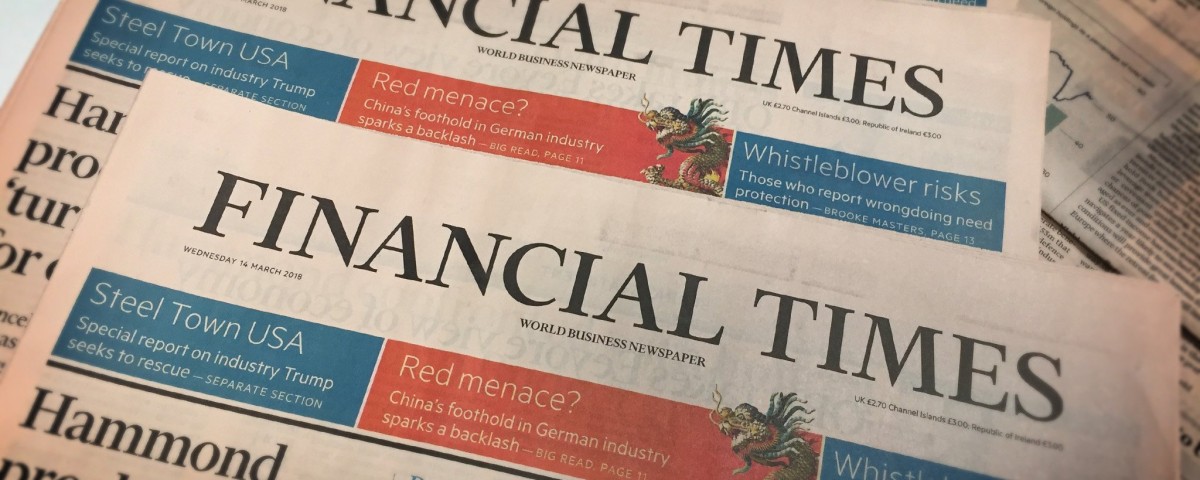
otra vuelta: Marcos Buscaglia “Este Gobierno está destruyendo la inversión”
4 February, 2021
la nacion: Los terraplanistas de la economía manejan hoy el país
15 February, 2021FINANCIAL TIMES: Democracy is under threat, we must add a D to ESG
Democracy bonds could empower the fight for human rights
Green bonds, designed to finance projects with positive environmental or climatic effects, are one response from financial markets to an existential threat facing the human race.
Yet human beings currently face another threat, to which financial markets appear oblivious: the undermining of democracy and human rights around the world.
Your pension fund is probably financing governments that are undoing democracy’s checks and balances and threatening the rights of political opponents and of ethnic, religious and other minorities. It is time to create democracy bonds and democracy indices to challenge this threat.
Activism exerted through financial markets already extends beyond climate change. ESG — environmental, social and governance — criteria have been embraced by the world’s biggest asset managers. While no doubt demonstrating a commitment to ethical investing, such decisions are also driven by a commercial response to client requests.
Similar concerns should be harnessed to confront the global threat to democracy. However, activism in this area is made more complicated by the relative lack of objective measures of democracy that could be applied in the same way as scientific evidence of climate change.
Moreover, democracy is no longer dying in the old-fashioned way, through military coups. In their book How Democracies Die, Steven Levitsky and Daniel Ziblatt write: “There is another way to break a democracy. It is less dramatic but equally destructive. Democracies may die at the hands not of generals, but of elected leaders — presidents or prime ministers who subvert the very process that brought them to power . . . More often . . . democracies erode slowly, in barely visible steps.”
They add: “Many government efforts to subvert democracy are ‘legal’, in the sense that they are approved by the legislature or accepted by courts.”
Unlike investment projects that can be technically assessed to determine their environmental impact, there is no clear objective measure in the case of democracy. In the words of Levitsky and Ziblatt, “Because there is no single moment — no coup, declaration of martial law, or suspension of the constitution — in which the regime obviously ‘crosses the line’ into dictatorship, nothing may set off society’s alarm bells.”
Nevertheless, the pattern of democratic retreat is consistent and widespread around the globe. Foreign Affairs magazine recently argued that “the leading figures on the world stage today practise a brutal, smash-mouth politics, a personalised authoritarianism. Old-school strongmen, they do whatever is needed to grasp and hold on to power”.
The democratic retreat affects countries in all continents: Turkey, Poland, Hungary, Russia, Nicaragua, Venezuela, Bolivia, Niger, the Philippines and India, among many others. Even in countries such as Brazil, Italy and the US, standards of liberal democracy have been eroded.
Yet, while it is not easy to measure democratic standards, it is not impossible.
The Economist Intelligence Unit has produced a Democracy Index since 2006. Its 2019 edition reported its worst score to date.
Freedom House has produced an annual Freedom in the World report since 1973, which now covers 195 countries and 14 territories. Its index incorporates factors such as the electoral process, political pluralism and participation, the functioning of government, freedom of expression and of belief, rights of association and organisation, the rule of law and personal autonomy and individual rights. It groups countries as Free, Partly Free and Not Free.
Like the EIU, it paints a picture of democracy in decline: “Freedom in the World has recorded global declines in political rights and civil liberties for an alarming 13 consecutive years, from 2005 to 2018. The global average score has declined each year, and countries with net score declines have consistently outnumbered those with net improvements.”
Meanwhile, the amount of finance available to such governments has been on the rise.
According to the Bank for International Settlements, as of mid-2019 there were $2.7tn of outstanding international debt securities issued by developing countries, of which $1.2tn were sovereign bonds. Of these, about one-third were issued by countries described by Freedom House as Free, one-third by countries described as Partly Free and one-third by Not Free countries.
This is only part of the total debt issued by emerging markets, as it excludes domestic currency debt owned by foreigners. According to Colm McDonagh of Insight Investment, EM debt was only 2 per cent of the global bond universe in 2000 but has since grown to almost 25 per cent. Some of the biggest issuers are countries whose democratic credentials have deteriorated fast in recent years, such as China, Russia, Turkey and Poland. Venezuela has defaulted on about $70bn of sovereign and quasi-sovereign bonds, a debt pile that expanded quickly even as the Chávez and Maduro governments were destroying what only a few years ago was one of the most solid democracies in Latin America.
The flows of funding are impressive. In January this year alone, EM sovereigns issued $33.1bn and EM corporates $77.5bn, the second-highest monthly issuance on record. While democracy is in retreat in many emerging markets, more global funds are being allocated to support their governments.
As in other markets, exchange traded funds are an increasingly important vehicle. The iShares JPMorgan USD Emerging Market Bond ETF alone is worth $16bn. The total value of EM-dedicated ETFs, including stocks and bonds, is about $270bn. Financing wannabe dictators is easier than ever. It is time to raise awareness and, hopefully, rein in this trend.
Developing a democracy bond market would have to take a different approach from the green bond market. For sure, countries will not ask for a rating. Setting standards that can be freely adhered to will not do the trick either: it would not be hard for countries with fickle democracies to claim to be issuing democracy bonds. (After all, some of the least-democratic countries in the world have the word “Democratic” in their names.)
It would most probably require the creation of democracy indices by the likes of the EIU or Freedom House. These could be overlaid with existing bond indices, such as JPMorgan’s EMBI.
They could, for instance, set portfolio allocation limits for countries where standards of democracy have deteriorated by more than a certain margin in the previous year, or whose democracy index is below a certain threshold. They could also develop reporting standards for fund managers. What percentage of their portfolios is allocated to countries that are Partially Free and Not Free? Did their portfolio allocation increase for countries whose democracy score has fallen significantly in the previous year? Fund managers could display such measures to their clients, as they do with ESG.
What is at stake is not trivial, and timing is of the essence. We must add a D to ESG right now.
Autor: Marcos Buscaglia
LINK NOTA: https://www.ft.com/content/61ecdc28-76dd-466a-9ef9-104ad14af7da




